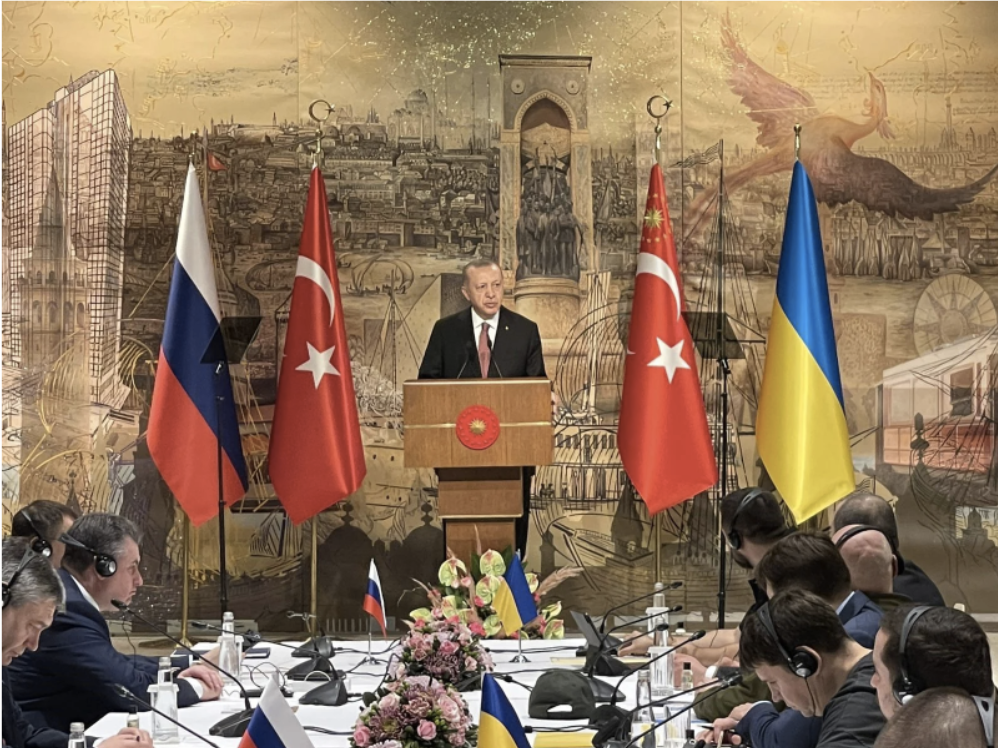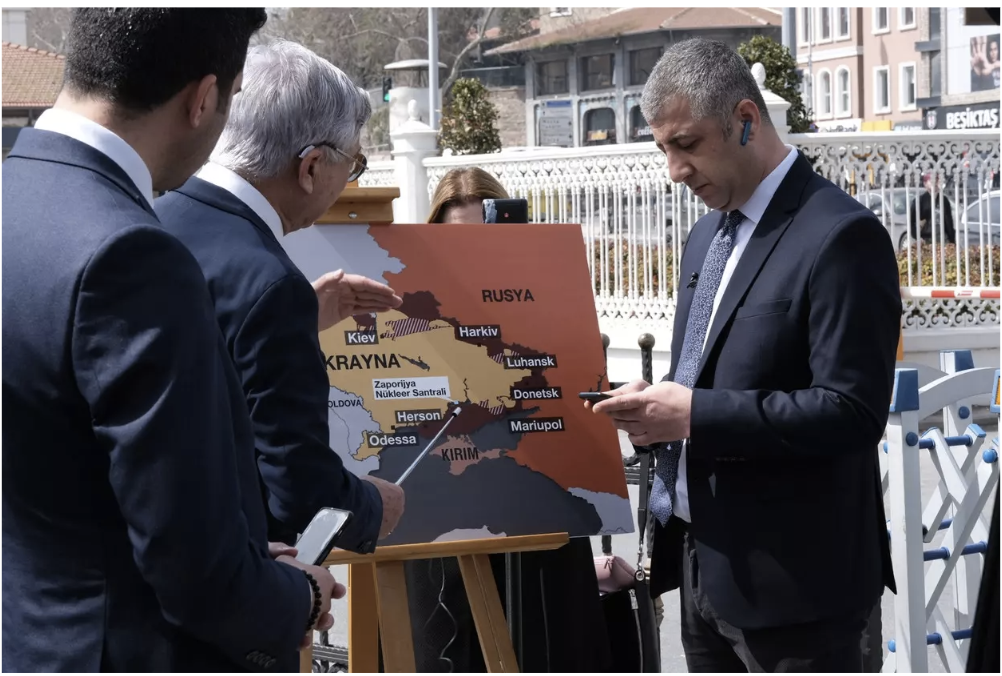Stakes High For Turkey Amid Ukrainian and Russian Peace Negotiations in Istanbul
Turkish President Recep Tayyip Erdogan welcoming Russian and Ukrainian delegates before the start of war mediation talks in Turkish city Istanbul on March 29, 2022. Photo: Ukrainian Foreign Ministry Press Service via Associated Press
As the war between Russia and Ukraine continues and mediation talks between the two parties come to an end in Istanbul, Turkey is in a unique spot not only as a mediator between the two warring nations but also as a so-called neutral nation in regards to the conflict. Turkey is a large geopolitical and economic player in the Black Sea and any disruption within or across the sea will have a great effect. This has resulted in conflicting policy decisions by Turkey, many in support and against both Ukraine and Russia. However, since the beginning of the conflict, Turkey has offered to host peace talks to mediate the conflict while making it clear that Ukrainian territorial integrity and sovereignty are paramount.
Being a NATO member, Turkey is in the unique position of being in the Western geopolitical military organization that Russia maintains an antagonistic relationship with, going so far to blame NATO for their invasion of Ukraine. However, Turkey does not always follow NATO's line and has made many decisions opposite of the organization's. On March 13, Turkish Foreign Minister Mevlüt Çavuşoğlu made it clear that Turkey will not join NATO in placing economic sanctions on Russia “as a matter of principle.” According to Çavuşoğlu, sanctions on Russia will not resolve this crisis and will only affect the Turkish economy and business sectors negatively.
Despite not joining in on sanctions, Turkey does benefit from them. Around 14,000 Russians have left Russia for Turkey since the conflict began on Feb. 24, with many carrying lots of cash. According to realtors, this cash is being used to buy property as a way to safeguard their money and investments from Western sanctions. Roman Abramovich, a Russian oligarch that has been sanctioned, participated in the talks between Ukraine and Russia in Istanbul on March 29. The week prior, two of his superyachts worth over a billion dollars were seen at a Turkish resort. This is not an issue to the Turkish government as Mevlüt Çavuşoğlu announced that any Russian is welcome to do business in Turkey as long as they follow international law.
The Turkish government sees this minor Russian exodus as an opportunity as the Turkish economy faces a currency crisis that started in February, where inflation reached a 20 year high of 54.4 percent. In addition, Turkish President Recep Tayyip Erdogan announced that the nation is open to business with any company that is leaving Russia and welcomes them to relocate to Turkey, seeing this as an opportunity for a boost to their struggling economy.
Members of the press standing next to a map of the war in Ukraine outside Dolmabahce presidential office after peace talks between Russian and Ukrainian delegates in Istanbul, on Tuesday, March 29, 2022. Photo: GocherImagery/MediaPunch/IPX via Associated Press/ Ilker Eray
Although Turkey needs Russia for economic support, Turkey isn't standing by and watching Ukraine burn. Turkey denounced the Russian invasion of Ukraine as unacceptable and a violation of international law. The nation also enacted a naval wartime measure to close the Dardanelles and Bosphorous Straits to warships that the 1936 Montreux Convention gave Turkey the right to do. Ukraine had called for this treaty to be implemented and Turkey obliged, closing the straits and preventing Russia from entering the Black Sea from the Mediterranean. The closure of the straits not only affects Russian warships trying to get to Ukraine but also prevents them from reaching other large conflicts taking place in Syria and Libya, where Turkey and Russia have conflicting interests. In addition, Turkey sold Turkish military Bayraktar drones to Ukraine, which are successfully attacking and defeating Russian forces in Ukraine.
Turkey previously sided with Ukraine in past conflicts between Russia and Ukraine, having never recognized the Russian annexation of Crimea in 2014 and even went so far as to denounce human rights abuses there, specifically against Turkish Crimean Tatars.
Turkey's neutrality in many geopolitical situations is not new, as they revived their foreign policy of “zero problems with our neighbors” and have taken advantage of this neutral position to mediate the Russia-Ukraine war and extend a hand to other countries that Turkey has had severed or disrupted ties with. For example, the relationship between Armenia and Turkey has been severed for a while, but the two nations announced the normalization of their relations in January and government officials began to meet each other. The continuation of Turkey's neutrality policy gives credibility to the nation to not only mediate the conflict between Ukraine and Russia but also improve their relationships with their neighbors even more.
On March 27, Presidential Spokesperson Ibrahim Kalın succinctly put Turkey's pro-Ukrainian, but not anti-Russian stance on the Russia-Ukraine war at the Doha international forum. “The war on Ukraine is unfair and is a provoked war. But if everybody burns bridges with Russia, who will talk to them about peace?” He added that “Ukrainians need to be supported by every means possible so they can defend themselves ... but the Russian case must be heard, one way or the other” to be understood, not justified.


